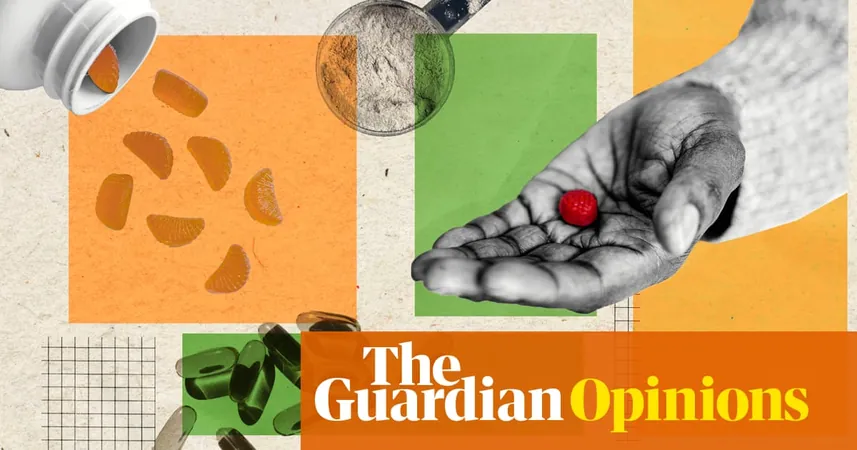
The Truth About Multivitamins: Do They Really Make You Healthier or Just Empty Your Wallet?
2024-12-04
Author: Ying
Introduction
As the health supplement market continues to boom, an astonishing estimated one-third to half of Australians are embracing the trend of taking vitamins and minerals regularly. The popularity of vitamin gummies has surged, notably among younger generations like millennials and Gen Z, many of whom are influenced by celebrities such as the Kardashian-Jenner clan and wellness gurus like Gwyneth Paltrow, whose lifestyle brand Goop markets a line of dubious health products.
Social media platforms, especially TikTok, are rife with influencers promoting multivitamin gummies and innovative products like vitamin patches that resemble colorful temporary tattoos. They often tout benefits like radiant skin, healthier hair, and higher energy levels. However, health experts warn that those seeking genuine health benefits may be wasting their money on these trendy supplements.
What Do Experts Say About Multivitamins?
Nutrition specialists emphasize that the average individual can meet their nutritional needs through a balanced diet rich in whole foods. “Healthy individuals with access to varied diets typically do not require vitamin supplements,” shares Barbara Mintzes, a professor at the University of Sydney. Support for this point comes from Professor Nial Wheate, who explains that the vast majority of supplementation does not yield any real health benefits.
Most multivitamins are composed of a blend of vitamins and minerals. However, experts contend that for many, consuming these extra doses results in expensive urine, as water-soluble vitamins are simply excreted once body stores are saturated. Clare Collins, a professor of nutrition, elaborates on the misconception that multivitamins can compensate for dietary inadequacies, stating that they often lack essential components like fibers and phytonutrients.
Recent scientific analyses, including multiple meta-studies, reveal stark findings: multivitamins do not enhance heart health, lower cancer risks, or extend lifespan. Notably, an Australian study concluded that multivitamins had no impact on mortality rates among older adults.
Interestingly, the popularity of multivitamins might stem from a psychological comfort—many people are aware that their diets are suboptimal and turn to supplements as a safety net. Collins cautions that these products can't replace essential nutrients derived from natural food sources.
In some instances, excessive supplementation can lead to serious health risks. While vitamin overdoses from multivitamins are rare, certain fat-soluble vitamins can be stored in the liver and potentially reach toxic levels. Isolated megadoses of any single vitamin pose a greater risk of harm, warns Collins.
Particularly for products claiming to improve beauty—like those targeting hair, skin, and nails—Dr. Helen Macpherson urges skepticism. The concentrations of beneficial ingredients are often too low to produce any significant physiological effects. A study revealed that many such supplements contain biotin, a B vitamin purported to aid growth, but lacked proven efficacy in healthy individuals.
In Australia, regulations on multivitamins are lighter than those for prescription medications, with only safety needed to market new vitamin products. Consequently, many companies are not required to prove their claims of effectiveness. Wheate also points out that vitamin patches may deliver low ingredient concentrations, and no patches are currently approved for sale in Australia.
Who Truly Benefits from Vitamin Supplements?
Despite the skepticism surrounding multivitamins, there are specific groups that can indeed benefit from supplementation. For instance, vegans may need to supplement with vitamin B12, primarily found in animal products. Those at risk of iron-deficiency anemia should consider iron supplements, while postmenopausal women may require calcium and vitamin D for bone health.
Expectant mothers are frequently advised to take folate, iodine, and vitamin D to support fetal development. Likewise, individuals with limited sun exposure or darker skin tones may also require vitamin D supplements.
For those afflicted with age-related macular degeneration, a specific combination of zinc and antioxidants known as AREDS2 has shown promise in mitigating the progression of the disease.
Conclusion
In conclusion, while vitamin supplements can serve specific needs, the general population should carefully assess their dietary habits and consult with healthcare providers before starting a regimen. A holistic approach to nutrition—favoring whole food sources—remains the best strategy for optimal health. So, before splurging on that trendy gummy or shiny vitamin patch, consider if it's genuinely what your body needs or just a costly placebo.




 Brasil (PT)
Brasil (PT)
 Canada (EN)
Canada (EN)
 Chile (ES)
Chile (ES)
 España (ES)
España (ES)
 France (FR)
France (FR)
 Hong Kong (EN)
Hong Kong (EN)
 Italia (IT)
Italia (IT)
 日本 (JA)
日本 (JA)
 Magyarország (HU)
Magyarország (HU)
 Norge (NO)
Norge (NO)
 Polska (PL)
Polska (PL)
 Schweiz (DE)
Schweiz (DE)
 Singapore (EN)
Singapore (EN)
 Sverige (SV)
Sverige (SV)
 Suomi (FI)
Suomi (FI)
 Türkiye (TR)
Türkiye (TR)